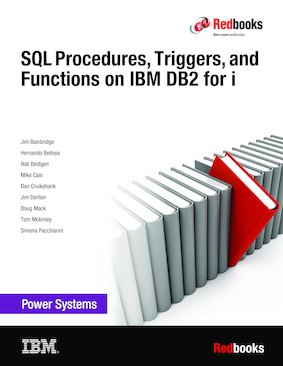Abstract
Structured Query Language (SQL) procedures, triggers, and functions, which are also known as user-defined functions (UDFs), are the key database features for developing robust and distributed applications. IBM® DB2® for i supported these features for many years, and they are enhanced in IBM i versions 6.1, 7.1, and 7.2. DB2 for i refers to the IBM DB2 family member and relational database management system that is integrated within the IBM Power operating system that is known as IBM i.
This IBM Redbooks® publication includes several of the announced features for SQL procedures, triggers, and functions in IBM i versions 6.1, 7.1, and 7.2. This book includes suggestions, guidelines, and practical examples to develop DB2 for i SQL procedures, triggers, and functions effectively.
This book covers the following topics:
- Introduction to the SQL/Persistent Stored Modules (PSM) language, which is used in SQL procedures, triggers, and functions
- SQL procedures
- SQL triggers
- SQL functions
This book is for IBM i database engineers and data-centric developers who strive to provide flexible, extensible, agile, and scalable database solutions that meet business requirements in a timely manner.
Before you read this book, you need to know about relational database technology and the application development environment on the IBM Power Systems™ with the IBM i operating system.
Table of Contents
Chapter 1. Introduction to data-centric programming
Chapter 2. Introduction to SQL Persistent Stored Module
Chapter 3. SQL fundamentals
Chapter 4. Procedures
Chapter 5. Triggers
Chapter 6. Functions
Chapter 7. Development and deployment
Chapter 8. Creating flexible and reusable procedures
Chapter 9. IBM i and IBM DB2 for i services
Appendix A. Allocating, describing, and manipulating descriptors
Appendix B. Additional material
